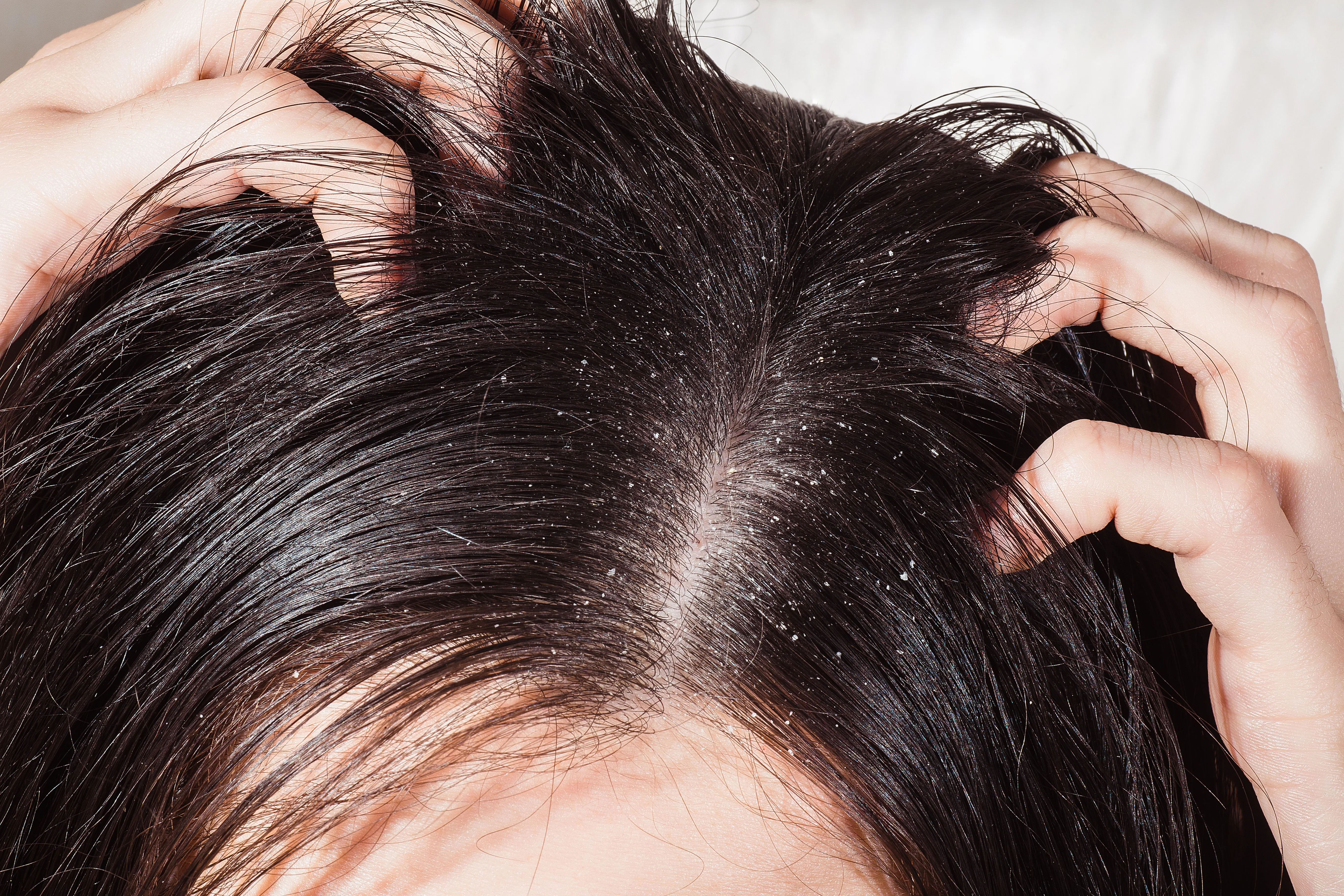Scalp Psoriasis vs Dandruff – How to tell the Difference?

Is there any difference between scalp psoriasis vs dandruff? Learn more.
To the uninitiated, any sort of scalp itching or flaking can be chalked up to dandruff . It’s an easy villain that affects almost half of the global population. But you could instead be suffering from a whole host of scalp ailments, such as eczema, folliculitis or even scalp psoriasis. Understanding the difference between these problems can be tricky but vital in determining the right approach to treatment, especially with conditions like scalp psoriasis.
What is Dandruff and How is dandruff formed?
Do you have dandruff or scalp psoriasis?
How do you treat these conditions?
What is Dandruff and How is dandruff formed?
Our skin regularly sheds dead skin cells to allow for healthier and undamaged skin to emerge. Presence of the fungus Malassezia Globose can act as an irritant by breaking down excessive scalp oil, leading to increased shedding on the scalp. This dandruff condition results in scalp redness, flaking, and itching.
This shouldn’t be confused with a dry scalp, as the cause of dandruff is usually an oily scalp. Dry scalp is caused when the oil layer on your scalp is unable to hold its form and allows for moisture loss. This is important when trying to differentiate between dandruff vs dry scalp vs psoriasis.
What is scalp psoriasis?
Scalp psoriasis is classified as an autoimmune disease that affects a small portion of the world. It’s a chronic condition that results in thick discolouration and scaling on your skin. At its core, scalp psoriasis triggers the body’s immune system into hyperactivity, attacking healthy parts of the body such as the skin.
Psoriasis affects the scalp, but can also be found on your elbows, back, groin, neck or behind the ears. It is usually accompanied by a burning or stinging sensation, and scratching can lead to bleeding. The symptoms can fluctuate, with the severity depending on a variety of factors – smoking, alcohol consumption, obesity, stress, medications.
Do you have dandruff or scalp psoriasis?
Distinguishing between head psoriasis vs dandruff can sometimes become difficult when the symptoms aren’t too intense. These often get hidden below your hair, becoming evident only when the itching and flaking increases.
However, the tell-tale sign of scalp psoriasis vs dandruff is the scaling and plaque formation. While new skin usually grows every month, scalp psoriasis greatly speeds up this process and causes it to happen every 3 to 4 days. This isn’t the case with dandruff. Looking for the amount of scaling is important in identifying which ailment you suffer from.
The simplest way to differentiate between scalp dandruff vs psoriasis is to look at their symptoms, at least as an initial assessment.
Dandruff
- An itchy, sometimes reddish scalp
- White or yellowish flakes
- Oily scalp
- Found on scalp and face
Scalp Psoriasis
- Discoloured and raised patches of scaly skin (plaques)
- High amount of flaking
- Temporary hair loss
- Pain and stinging
- Found on different parts of the body apart from scalp and face
- Bleeding due to scratching
- Sometimes associated with dry scalp
How do you treat these conditions?
Dandruff
There are several natural remedies you can use to manage dandruff. Creating hair masks from tea tree oil, aloe vera, neem, or lemon juice can provide relief to your head and attack the sources of your dandruff. Lifestyle issues must also be managed, as high levels of stress and an unhealthy diet can influence scalp health.
But perhaps the most effective home remedy is the use of an anti-dandruff shampoo, formulated to rid your scalp of dandruff. Like the Head & Shoulders Neem that can protect your scalp against dandruff causing germs, while deep cleansing and providing scalp hygiene.
Scalp Psoriasis
Identifying effective home treatments for scalp psoriasis is a tricky proposition, as everyone responds differently to certain remedies. There might not be cures for this condition just yet, but you can learn to manage the symptoms. Reducing your triggers is a very important step in this process.
A dermatologist will also recommend scale softeners, medicated shampoos or ointments, and even suggest UV light therapy. These might work for you, but it’s important not to try them without medical supervision.
Is it time to see a doctor?
Dandruff can usually be handled at home. However, if your products and remedies do not work, you must visit a doctor to determine the right course of action. Dandruff can be embarrassing in social situations and if it’s causing a lot of trouble, it may be best to get some professional intervention.
In the case of psoriasis scalp vs dandruff, most of the treatments involve medicated products. These can be effective in minimising inflammation and scaling, but should not be used on your own. If you feel that you’re suffering from psoriasis, you must visit the doctor. Get a clear diagnosis of your problems before trying to use any products at home.
FAQs
1. How do I know if I have dandruff or scalp psoriasis?
The easiest way to tell the difference is to notice what’s happening on your scalp. Dandruff leads to white, yellowish flakes on the scalp and potentially the eyebrows. Scalp psoriasis, on the other hand, leads to plaques on the scalp and surrounding areas.
2. Can scalp psoriasis go away?
Scalp psoriasis is an autoimmune disease and as of right now, there is no cure. However, it is quite manageable, and you can reduce flare-ups by controlling variables like your lifestyle.



